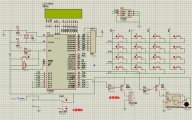基于单片机的语音电子锁设计

基于单片机的语音电子锁设计(任务书,开题报告,外文翻译,论文14000字)
摘要
如今,科学技术特别是电子技术发展得越来越迅速,有关电子的产品也越来越智能化,随着人们对锁的需求与日俱增,电子密码锁在市场上将会越来越流行。因此,研究出具有高安全性,便捷性,多功能性的电子密码锁来代替操作复杂,安全性差的传统机械密码锁是非常有必要的。
对此,本文研究的一款语音电子密码锁,以STC89C52单片机为核心,再搭配相关的辅助模块电路,来实现本课题要求的相关功能。语音电子密码锁硬件电路包括语音模块(采用WT588D芯片),显示模块(LCD1602),键盘输入模块(4*4制式),密码存储模块(采用24C02芯片),辅助电路包括复位、晶振、电源和锁开关电路等等。整个电子锁系统的软件由C语言编程来实现。本系统具有设置、修改6位用户密码、密码错误报警、实现语音提示并用液晶显示器进行使用操作提示等功能。通过最终实验测试,该设计能够很好的实现语音电子密码锁的所有功能,达到了设计要求。
关键词:语音电子密码锁;STC89C52单片机;报警;LCD
Abstract
Today, science and technology especially the electronic technology is developing more and more rapidly, the electronic products has become intelligentincreasingly, with the people's growing demand for the lock, electronic password lock in the market will become more and more popular. Therefore, it is necessary to study the electronic cipher lock with high security, convenience, and multi functional instead of the traditional mechanical cipher lock with complex operation and poor security. [资料来源:Doc163.com]
So, this paper studies a voice electronic password lock, with STC89C52 microcontroller as the core, and then with the relevant auxiliary module circuit, to achieve the requirements of the relevant functions of the project. The hardware circuit of voice electronic password lock includes the voice module by using the WT588D chip, LCD1602 display module, keyboard input module (4 * 4 standard) and password storage module (24C02 chip), besides,the auxiliary circuit includes reset, crystal, power and lock switch circuit and so on. The software of the whole electronic lock system is programmed by C language.This system has the function of setting up, modifying 6 user password, password error warning, implementing voice prompt and using the LCD display. Through the final test, the design can achieve all the functions of a good voice electronic password lock, so achieving the design requirements.
Keywords:voice electronic password lock; STC89C52 single chip microcomputer; alarm; LCD
[资料来源:http://www.doc163.com]

目录
摘要 I
Abstract II
第1章绪论 1
1.1 引言 1
1.2 研究背景及其意义 1
1.3 研究现状及发展趋势 2
1.4 本文研究目标与内容 3
1.5 论文内容纲要 3
第2章系统方案及硬件设计 4
2.1 引言 4
2.2 初定方案设计 4
2.2.1 系统电源模块选择 4
2.2.2 主控制器模块选择 4
2.2.3 显示模块选择 5
2.3 最终方案设计 5
2.4 系统硬件设计 6
2.4.1 主控制模块 7
2.4.2 时钟电路与复位电路 8 [资料来源:Doc163.com]
2.4.3 电源电路 9
2.4.4 键盘输入电路 9
2.4.5 存储芯片电路设计 10
2.4.6 液晶显示电路设计 11
2.4.7 报警电路 11
2.4.8 语音模块设计 12
2.4.9 密码锁电路 14
第3章系统软件设计 15
3.1 引言 15
3.2 设计语言 15
3.3 软件开发平台 15
3.3.1 Keil软件介绍 15
3.3.2 Keil的使用方法 15
3.4 主程序流程图 17
第4章系统仿真与测试 19
4.1 引言 19
4.2 软件仿真结果 19
4.2.1 Keil软件仿真结果 19
4.2.2 Proteus软件仿真结果 20
4.3 系统实物测试 22
4.3.1 硬件电路的组装 22
4.3.2 运行结果 23
第5章总结 27 [资料来源:http://www.doc163.com]
参考文献 28
附录A 电路原理图 29
附录B 源程序 30
致谢 52 [资料来源:www.doc163.com]
